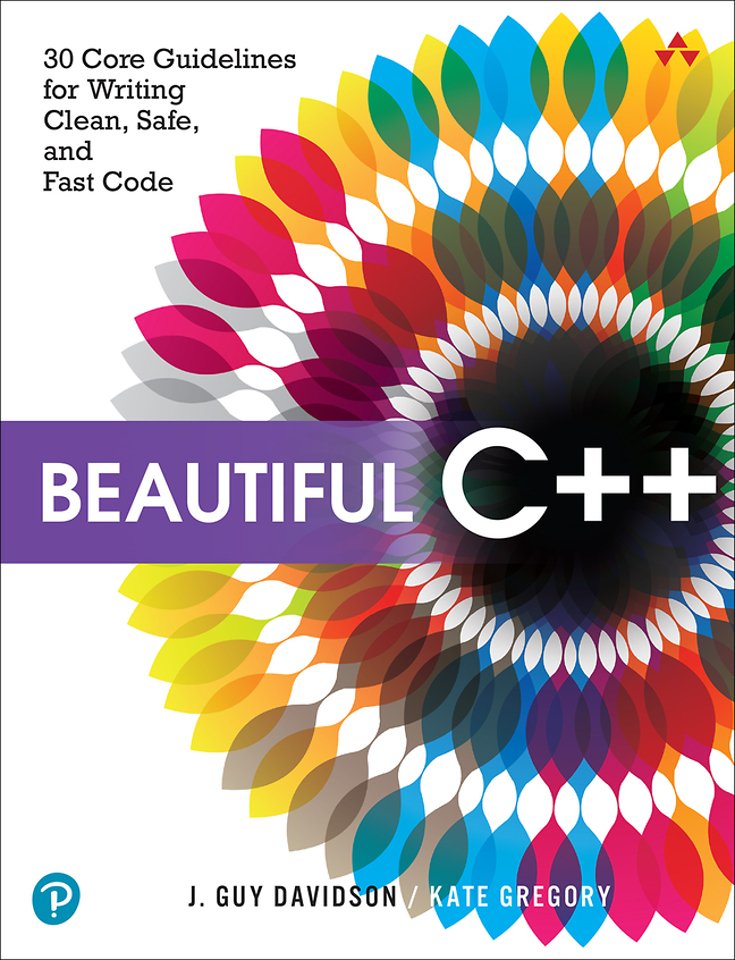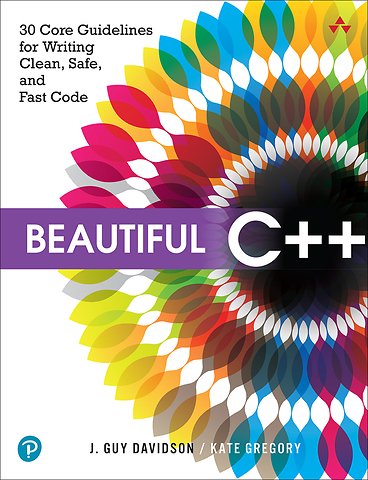Beautiful C++
30 Core Guidelines for Writing Clean, Safe, and Fast Code
Samenvatting
Discover the Beauty of Modern C++
" Beautiful C++ presents the C++ Core Guidelines from a developer's point of view with an emphasis on what benefits can be obtained from following the rules and what nightmares can result from ignoring them. For true geeks, it is an easy and entertaining read. For most software developers, it offers something new and useful."--Bjarne Stroustrup, inventor of C++ and co-editor of the C++ Core Guidelines Writing great C++ code needn't be difficult. The C++ Core Guidelines can help every C++ developer design and write C++ programs that are exceptionally reliable, efficient, and well-performing. But the Guidelines are so jam-packed with excellent advice that it's hard to know where to start. Start here, with Beautiful C++.
Expert C++ programmers Guy Davidson and Kate Gregory identify 30 Core Guidelines students will find especially valuable and offer detailed practical knowledge for improving their C++ style. For easy reference, this book is structured to align closely with the official C++ Core Guidelines website. Throughout, Davidson and Gregory offer useful conceptual insights and expert sample code, illuminate proven ways to use both new and longstanding language features more successfully, and show how to write programs that are more robust and performant by default.
-Avoid "bikeshedding": stop wasting valuable time on trivia
-Understand how to write code that will not cause problems later
-Know which legacy features to avoid and the modern features to use instead
-Use newer features properly, to get their benefits without creating new problems
-Default to higher-quality code that's statically type-safe, leak resistant, and easier to evolve
-Use the Core Guidelines with any modern C++ version: C++20, C++17, C++14, or C++11
There's something here to improve virtually every program students write, design, or maintain. For ease of experimentation, all sample code is available on Compiler Explorer at https://godbolt.org/z/cg30-ch0.0.Register this book for convenient access to downloads, updates, and/or corrections as they become available. See inside book for details.
Specificaties
Inhoudsopgave
Foreword xv
Preface xvii
Acknowledgments xxi
About the Authors xxiii
Section 1: Bikeshedding is bad 1
Chapter 1.1: P.2: Write in ISO Standard C++ 3
Chapter 1.2: F.51: Where there is a choice, prefer default arguments over overloading 13
Chapter 1.3: C.45: Don't define a default constructor that only initializes data members; use in-class member initializers instead 23
Chapter 1.4: C.131: Avoid trivial getters and setters 31
Chapter 1.5: ES.10: Declare one name (only) per declaration 41
Chapter 1.6: NR.2: Don't insist to have only a single return-statement in a function 49
Section 2: Don't hurt yourself 59
Chapter 2.1: P.11: Encapsulate messy constructs, rather than spreading through the code 61
Chapter 2.2: I.23: Keep the number of function arguments low 71
Chapter 2.3: I.26: If you want a cross-compiler ABI, use a C-style subset 79
Chapter 2.4: C.47: Define and initialize member variables in the order of member declaration 87
Chapter 2.5: CP.3: Minimize explicit sharing of writable data 97
Chapter 2.6: T.120: Use template metaprogramming only when you really need to 107
Section 3: Stop using that 119
Chapter 3.1: I.11: Never transfer ownership by a raw pointer (T*) or reference (T&) 121
Chapter 3.2: I.3: Avoid singletons 129
Chapter 3.3: C.90: Rely on constructors and assignment operators, not memset and memcpy 139
Chapter 3.4: ES.50: Don't cast away const 149
Chapter 3.5: E.28: Avoid error handling based on global state (e.g. errno)159
Chapter 3.6: SF.7: Don't write using namespace at global scope in a header file 169
Section 4: Use this new thing properly 179
Chapter 4.1: F.21: To return multiple "out" values, prefer returning a struct or tuple 181
Chapter 4.2: Enum.3: Prefer class enums over "plain" enums 193
Chapter 4.3: ES.5: Keep scopes small 201
Chapter 4.4: Con.5: Use constexpr for values that can be computed at compile time 213
Chapter 4.5: T.1: Use templates to raise the level of abstraction of code 225
Chapter 4.6: T.10: Specify concepts for all template arguments 235
Section 5: Write code well by default 45
Chapter 5.1: P.4: Ideally, a program should be statically type safe 247
Chapter 5.2: P.10: Prefer immutable data to mutable data 259
Chapter 5.3: I.30: Encapsulate rule violations 267
Chapter 5.4: ES.22: Don't declare a variable until you have a value to initialize it with 275
Chapter 5.5: Per.7: Design to enable optimization 285
Chapter 5.6: E.6: Use RAII to prevent leaks 293
Envoi 305
Afterword 307
Index 309
Vergelijkbare boeken
Anderen die dit boek kochten, kochten ook
Net verschenen
Rubrieken
- aanbestedingsrecht
- aansprakelijkheids- en verzekeringsrecht
- accountancy
- algemeen juridisch
- arbeidsrecht
- bank- en effectenrecht
- bestuursrecht
- bouwrecht
- burgerlijk recht en procesrecht
- europees-internationaal recht
- fiscaal recht
- gezondheidsrecht
- insolventierecht
- intellectuele eigendom en ict-recht
- management
- mens en maatschappij
- milieu- en omgevingsrecht
- notarieel recht
- ondernemingsrecht
- pensioenrecht
- personen- en familierecht
- sociale zekerheidsrecht
- staatsrecht
- strafrecht en criminologie
- vastgoed- en huurrecht
- vreemdelingenrecht













